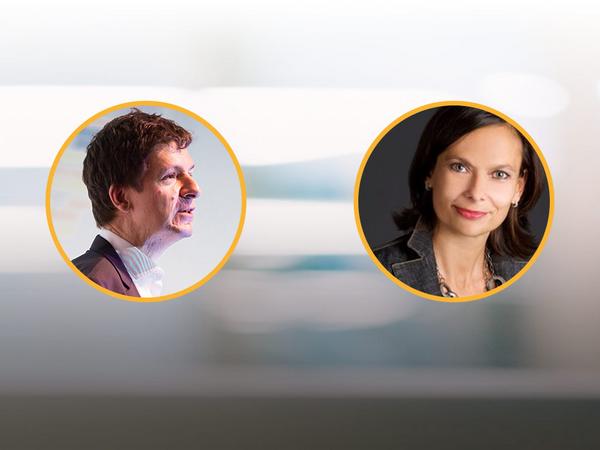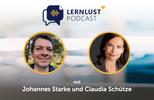LERNLUST #5 // 11 Theses on the Development of Learning in Organizations

Shownotes
Host:
Claudia Schütze, Senior Learning Consultant & Trainerin // LinkedIn
Guest:
Johannes Starke, Product Manager Learning // LinkedIn
Johannes Starke: 11 Thesen zur Entwicklung von Lernen in Organisationen
Jane Hart: Modern Workplace Learning
Harold Jarche: Personal Knowledge Mastery
70:20:10 - is this the formula for successful learning?
You can also find all episodes of our LERNLUST podcast at:
Apple Podcasts | Spotify | Google Podcasts | Amazon Music | Deezer
Introduction
[Claudia Schütze]
Lernlust, the podcast for everything related to corporate learning.
[Susanne Dube]
We are Claudia Schütze and Susanne Dube and we are learning consultants at tts and we are the hosts of this podcast.
[Claudia Schütze]
And here we will exchange ideas about topics related to our work, in other words, everything that affects learning in organizations today and in the future.
[Susanne Dube]
And from time to time we will invite internal or external experts to join us. And we hope you will join us.
[Claudia Schütze]
Hello Johannes.
[Johannes Starke]
Hello dear Claudia.
[Claudia Schütze]
It's great to have you with us today and to have time to sit down with me on our virtual coffee kitchen sofa. I'm very happy, this time I'm making the introduction a bit more charming than last time. I'll briefly introduce you to our listeners, especially those who may not yet know you from our last episode on the subject of Barcamps.
Johannes Starke, my esteemed colleague from product management in the field of learning at tts. We are both intensively involved with all topics related to corporate learning. Johannes, would you like to add anything?
[Johannes Starke]
Yes, I would like to. I'm very happy to be here, especially because our field of topics is constantly growing. When I started at tts, our focus was still limited to relatively specific topics. Now I have the opportunity to deal broadly with the question of how learning in organizations is changing – through digitalization, new technologies and the challenges of our working world.
Overview of Trends in Corporate Learning
[Johannes Starke]
And since the field has become so large, we thought today that we would venture an overview, right?
[Claudia Schütze]
Absolutely, Johannes. That is exactly our topic today. I'll formulate the headline: We want to look at current trends in learning.
Johannes, in your role as product manager, you are often involved with these topics in customer meetings, presentations and keynote speeches. You have currently formulated eleven theses on the subject.
11 Theses
[Claudia Schütze]
We want to present these eleven theses today, exchange our thoughts on them and share them with our listeners. Of course, with the idea of exploring some of the theses in more detail in future episodes. But today we'll start with a broad overview. Johannes, I've already teased the eleven theses.
Should we just present them one after the other so that our listeners know what to expect before we go into more detail?
[Johannes Starke]
That sounds sensible. We can also provide the theses in writing in the show notes.
[Claudia Schütze]
Yes, that's a very good idea.
[Johannes Starke]
I'm also looking forward to additions or objections from the listeners, because we're all learning. Our subject area is constantly growing.
[Claudia Schütze]
Absolutely, discussions are exactly what I'm interested in. Very nice.
Johannes, let's start. What's thesis number one?
[Johannes Starke]
The job is to learn.
[Claudia Schütze]
Okay, I'll take it from here. Proposition number two: People are increasingly becoming responsible for their own learning.
[Johannes Starke]
Proposition number three: Learning takes place in networks.
[Claudia Schütze]
Great point. Proposition number four: Learners share their knowledge with their colleagues.
[Johannes Starke]
Proposition number five: Learning content is provided when, where and how it is needed.
[Claudia Schütze]
Proposition number six: Concrete, individual learning experiences are becoming more and more important for every learner.
[Johannes Starke]
Proposition number seven: The data is there – do we want to use it?
[Claudia Schütze]
Proposition number eight: Effectiveness and sustainability are becoming more and more important.
[Johannes Starke]
Proposition number nine: Online is becoming the new standard.
[Claudia Schütze]
Proposition number ten: The world of possibilities is becoming more and more diverse.
[Johannes Starke]
And if I counted correctly, we have arrived at the eleventh and final proposition.
[Claudia Schütze]
Absolutely.
[Johannes Starke]
Thesis number eleven: L&D is transforming from a course supplier to a strategically oriented enabler.
[Claudia Schütze]
Wow, we've opened up a whole new universe with that – and that was exactly our intention.
Johannes, let's take a closer look at some of the theses today. We want to give our listeners a few details about your eleven theses and the trends in learning. Would you like to start with the first thesis, “The job is to learn”?
The Job is to Learn
[Johannes Starke]
Yes, what naturally comes to mind is the somewhat controversial 70-20-10 formula, which roughly summarizes that we gain about 10 percent of our learning experiences in formal contexts, 20 percent through exchanges with colleagues or others on the job, and 70 percent directly in the course of accomplishing our tasks.
Whether it's exactly 70-20-10 or other numbers – that's not what we're concerned with here. There are many critics who say that these numbers come from contexts that are no longer relevant today. But I think the key message is crucial: the majority of our learning takes place at work. The earlier separation – two days of seminars, then you go back to work and the learning is over – is long outdated.
[Claudia Schütze]
Absolutely, Johannes. I agree with you. But that also means a new attitude towards learning, which employees often have to recognize for themselves first. That's a big step.
[Johannes Starke]
Exactly. Do we want to move straight on to the next thesis or go into a little more detail?
[Claudia Schütze]
I think you have a few more exciting thoughts on this that you could share with us, Johannes.
[Johannes Starke]
Yes, I'd be happy to. One example is the work of Jane Hart, who conducts an elaborate survey on the topic of modern workplace learning every year. She asks knowledge workers: How do you learn? Which tools do you use? In which contexts?
The picture that emerges is similar to that of 70-20-10. However, she uses the model of the “4Ds of Learning”: Didactics, Discovery, Doing and Discourse. These four areas include formal learning (didactics), independent discovery and doing (discovery and doing), and social exchange (discourse). Here, too, learning while working and interacting with others dominates. What I find exciting is that these processes do not occur separately – there are no rigid phases. Instead, we constantly oscillate between formal and informal learning moments.
[Claudia Schütze]
Absolutely, Johannes. This is often challenging in training. Especially in virtual training, participants want to apply content immediately in their daily work. That fits perfectly with your thesis that “learning is working”.
But sometimes we say: “Please don't jump straight into the day-to-day business.” We want the participants to also explore other topics that are covered in the training. It's a balancing act. But basically that's the essence: try things out and learn in everyday life.
Incidentally, if you ask employees, “What did you learn today?” it's often not that easy to answer.
[Johannes Starke]
Yes, that has to do with conscious reflection.
[Claudia Schütze]
Exactly. And I think that's an exciting starting point: motivating people to consciously observe what they have learned at the end of a working day. Many would have a great “aha” experience.
[Johannes Starke]
I'm sure of it.
[Claudia Schütze]
Good, Johannes. So, “Learning is working” was your first thesis. Let's move on to the next thesis.
People are Increasingly Becoming Responsible for their own Learning
[Claudia Schütze]
The next thesis of yours was “people are becoming more and more responsible for their own learning”. Would you like to share a few of your thoughts on this?
[Johannes Starke]
The most obvious example we mentioned in the 70-20-10 formula is that work contexts have changed so much that the previous principle, in which you were predefined based on the role of what you need to learn, no longer works. Today, we have to decide for ourselves what we need to do our jobs well. There is no superior who can and should know everything that employees need to learn.
[Claudia Schütze]
That's interesting, Johannes. I would like to add another thought in this context. If learning is increasingly self-directed and learners take more responsibility for their own learning, that doesn't mean that they just pick topics out of thin air. Rather, it is important that learning always takes place in the context of overarching corporate goals and specific goals for one's own team. Learners should deal with topics that are relevant to their work and that they can also apply directly in their daily work. At the same time, this development involves learners receiving the necessary framework and support to successfully implement this self-organized and self-directed learning and to make it satisfactory for themselves.
[Johannes Starke]
Yes, on the one hand it is a process of negotiation, but it is also a matter of trust. It is about me and my colleagues jointly negotiating what we need to work well together as a team – and we can do that independently. To do this, certain formats or spaces can be created to support this, such as “Open Fridays”, where learning teams are formed. In this way, we as a team can also shape the learning processes together. But it also means that I myself decide when I need time for a formal learning process or whether I acquire additional knowledge during my work, which may take a little longer to process but helps me develop new skills.
[Claudia Schütze]
Absolutely, and I think that these are central issues in the context of self-directed learning and personal responsibility. But for it to really work, Johannes, it certainly also needs the right conditions.
[Johannes Starke]
There are various models, but I wouldn't claim to have found the perfect way to organize it. I don't think there is such a thing.
I'm particularly interested in models like slack time, Google time or 20% time, which are often mentioned as solutions when it comes to giving employees one day a week to devote entirely to learning. But in my opinion, this separation between learning and working no longer works. I recently heard about a model that is being used by an IT consultancy and that is called “trust learning time”. It has been agreed that up to 50% of all learning activities can be counted as working time, regardless of what you are learning.
The trust is crucial here: colleagues are allowed to assess for themselves what they need for their further development. Especially in IT, for example when learning a new programming language, there is no need to justify why you are learning it. Employees have the freedom to educate themselves without being held to account, and that can even be up to 50% of their working time.
[Claudia Schütze]
I think it's a very exciting and, in my opinion, motivating learning model. As I understand it, the topics are not predetermined, but the learners choose them themselves. This also allows them to decide how much time they want to invest in order to delve into the respective topics.
[Johannes Starke]
What is really important in this context is the culture of sharing. When I learn something, I see it as my obligation to share this knowledge with my colleagues so that everyone can benefit from it. We can go into this in more detail later.
[Claudia Schütze]
I think we now have a good idea of how to understand the thesis that learners increasingly take responsibility for their own learning. Now let's move on to the next thesis: “Learning takes place in networks.”
This is a topic that is very close to your heart. Could you please expand on that a little more?
Learning takes place in Networks
[Johannes Starke]
I think that the topic of networks is actually close to both of our hearts. It is no longer enough to exchange ideas only within your own, fixed team. Knowledge sharing and collaboration must also take place across organizational silos. Often, the formal structure of an organization does not promote collaboration based on knowledge and experience. Instead, a second, informal structure for sharing knowledge has been established, which arises almost automatically.
But it is also crucial to look beyond the boundaries of one's own organization. I remember a quote from Harold Jarche: “Outside the organization is smarter than inside the organization.” That sums it up. According to his “Seek, Sense, Share” model, the point is that we often find many interesting ideas outside of our usual work contexts, often by chance, that could be relevant to our work. We then bring these impulses, which we discover in social networks or other external sources, for example, into our informal discussion groups or communities of practice. In these spaces, we can further develop these new ideas and enrich them with meaning, and finally integrate them into our specific work environment. The entire process, which consists of discovering, understanding and sharing, is a continuous cycle that plays an important role in today's work.
[Claudia Schütze]
Absolutely, Johannes. I can report from my own experience that social networks are learning networks in the truest sense of the word for me. It all started with Twitter for me, but currently it is mainly LinkedIn that offers me numerous suggestions. These often come unexpectedly and are not something I specifically look for, but simply happen. I then follow up on the topics that interest me and bring them into discussions, for example with you or with our other trainers.
From these conversations and suggestions, new ideas and developments then arise. I think that the large community on LinkedIn can achieve much more than our internal network, although the latter is of course also very valuable. For me, the difference lies in the source of inspiration and the wide range of topics generated in these networks.
[Johannes Starke]
The context you just described can be described as very informal – in social networks, you can encounter everything and nothing, depending on who you follow and what filters you set. However, I also find the formal events that can promote this networking exciting. One example would be peer-to-peer learning opportunities that we can create in the organization to enable these new types of networking and the visibility of people.
We have already mentioned the Barcamp format in the last episode. It just occurs to me that we relatively often hold lean coffees, a quick and uncomplicated format to first understand what topics are on our colleagues' minds. Then I think of corporate MOOCs, where we offer a time frame over several weeks to deal with a different topic each week. The colleagues then join forces across the famous silo boundaries and work together on this topic. This is how new ideas are born.
[Claudia Schütze]
Absolutely, and I would like to mention another very preferred format: Working Out Loud. This is still one of the formats that I consider to be predestined for learning in networks. I find it particularly exciting that it can be built and designed both within and outside of an organization. There are many small, medium and large companies that have already excelled at enabling Working Out Loud learning circles.
But it can also be done openly, so that I can set up these learning groups or learning circles with people outside my usual bubble, outside my normal network. Over a fixed period of time and with a clear structure, which is typical for agile learning formats, but at the same time offering individualized content, I can work on a self-selected goal and learn in the network.
[Johannes Starke]
The nice thing about Working Out Loud is that we can use this format to practice networking. If I'm not yet comfortable approaching strangers or networking in open social networks, Working Out Loud – or LernOS – offers a wonderful training ground. It creates a structured way to engage with new contacts and learn how to navigate such networks in a supportive environment.
[Claudia Schütze]
I had completely forgotten that, Johannes, you are so right! Because that is really a fundamental goal in these learning groups: to inspire and promote precisely this competence. A super good point, thank you very much for that, Johannes.
Well, do we have anything more to say on this theory, or do we want to move straight on to the next thesis?
[Johannes Starke]
I was just about to say that we are actually already in the middle of the next thesis.
Learning Support Whenever You Need it
[Johannes Starke]
Supporting learning content when, where and how it is needed – again, this is where learning and working become one. But I think we can tell this story on an even larger scale.
[Claudia Schütze]
Go ahead, please. We're excited.
[Johannes Starke]
The concept of performance support is perhaps familiar to many – it's about providing supporting materials exactly when I need them in the work context. Not this learning-for-stock, where I have a problem in a software or machine after months and then no longer know what to do. Instead, we create a structure of content and supporting elements that helps us to always have the right thing at the right time. The concept of the “Five Moments of Need”, developed by Bob Mosher and Conrad Gottfredson, describes this principle.
[Claudia Schütze]
Yes, that sounds interesting, Johannes. Would you like to briefly introduce the concept again, at least very roughly?
[Johannes Starke]
To give a brief overview: the first moment of need is when I have to learn something new. Here I need formal basic knowledge to understand the fundamental concepts. The second moment is when I want to learn more about something. The basic paths have already been laid, but the deepening often becomes more individual. Here, too, we are still in formal learning contexts.
[Claudia Schütze]
Exactly. And that's also important, Johannes, in my opinion. In recent discussions, I have noticed a slight tendency to say that formal learning is no longer as important. However, I don't agree with that. Because for the two moments of need that you mentioned, I need exactly this formal learning – now and in the future.
[Johannes Starke]
Exactly, the performance support concept goes further here. The third moment is applying or remembering something. For example, if we want to activate the out-of-office assistant in Outlook after a long absence, we have often forgotten how to do it. In this case, it would be inappropriate to watch a 30-minute tutorial. Instead, we need quick help, such as a checklist or a pop-up that shows us exactly what steps are necessary.
The fourth moment – when a problem occurs.
[Claudia Schütze]
I think that's the classic one. So, something happens, what do I do now?
[Johannes Starke]
Exactly, the fifth moment is very similar: when something changes. In such cases, traditional manuals or learning programs are often too slow.
[Claudia Schütze]
That's right. The questions that arise when a problem occurs or something changes are often very specific and detailed, and this is precisely where formal learning materials fail, as they are usually not specific enough.
[Johannes Starke]
And just to give an example: if a problem occurs with a machine, like an error code 11 with our washing machine, I can always check YouTube to see what's clogged up. It's a bit more complex with larger machines. I'm sure that there are at least ten colleagues out there who have had similar problems and know a workaround. Tip: Do this or that. There are also systems like Loop, which is offered to our software development colleagues. It is a mobile application that technicians use in the field to exchange information. What does this error mean? How did you fix it? Sure, you can also do that via chat or call, but to make it accessible to everyone, a database is built up that stores knowledge in the long term.
[Claudia Schütze]
Absolutely, Johannes. This is a particularly exciting approach that we should perhaps look at in more detail. It is about helping people who don't have the luxury of a workplace with a PC and everything that we have. They can't learn while they work, but are on the road or have timed working hours due to the production process, which makes it impossible for them to learn on the side. This is a really interesting area that we should definitely explore in more depth.
Well Johannes, we've looked at the increasingly individualized learning experience. I'd like to move on to your next thesis.
Concrete Individual Learning Experiences
[Johannes Starke]
Concrete, individual learning experiences – the term “learning experience” or “learning experience platforms” is a very trendy term. What is important to me here is that in the past, I was often assigned a learning opportunity because someone else knew what I needed and assigned it to me accordingly.
Nowadays, learners are much better at assessing what they need and what is relevant in their work context. This can also be done with technical support, for example through learning experience platforms. These offer learners the opportunity to choose from an open catalog what they need for their personal work and development. At the same time, they can coordinate with colleagues and ensure that they are on the right track.
Or to see how someone who works in a similar context has solved a problem and to use that as a guide. It's about understanding the learners' perspective and putting their needs first.
[Claudia Schütze]
Yes, very good point, Johannes. It is important to consider whether learners are really able to select the right content for themselves. Here it could be helpful to address the topic of learning competence and support learners so that they can set learning goals in a self-directed way and pursue them effectively. This empowers them to design their own individual learning experience and steer it in the right direction.
[Johannes Starke]
I also think that it should go hand in hand. We shouldn't rely exclusively on algorithms that claim to be able to recognize our needs. I'm talking about the usual recommendation mechanisms that are used in learning experience platforms and that claim to capture learning data and then use artificial intelligence to place it in a certain context.
The Data is There. Do We Want to Use it?
[Johannes Starke]
I tend to be skeptical, and this is perhaps also a personal attitude of mine, about whether we really want to use the data when it is available. That is the next question. I tend to trust in the cleverness of people and in the fact that they recognize what they need. The trust that is placed in them is also crucial in my opinion.
That's why I think we have to be very careful about collecting learning data and leaving it to algorithms that may produce biased results. We often talk about “biased algorithms” that cement the status quo based on data sets that only reflect past patterns. What has been cemented a thousand times in the past does not necessarily have to be the same in the future. This is a broad field that, I believe, we do not need to explore in detail now.
But I do think it's important to consider very carefully what data we collect, especially for reasons of acceptance, particularly with regard to interest groups. At the same time, we should consider in which areas we rely more on trust and self-representation.
[Claudia Schütze]
Security. But I think it also has a lot of potential, Johannes, and that's exactly why it's currently of intense interest to many people. All right, then let's look at your next thesis.
Online Becomes the New Standard
[Claudia Schütze]
And the next thesis was: online becomes the new standard. I think we can only agree with that, can't we, Johannes? Is that actually still a real trend?
I would say that it has already manifested itself to a certain extent, at least in the last year. We have tried a lot and established habits over the course of a good year. It is not without reason that it is said that habits can arise from repeated action.
It is said that it takes about three months to turn behavior into a habit. I think after a year we have managed to get to grips with learning online. This was a great opportunity to establish online learning formats as the standard and to create habits.
For me, virtual learning opportunities are not a temporary stopgap solution, but have a clear right to exist because they offer many advantages. This does not mean that there will no longer be any face-to-face formats. But I believe that in the future we will be much more critical about whether a face-to-face format is necessary for every topic or whether a lot of it can be covered very well by online learning opportunities.
The best reference is the learners, the participants in our programs. They are now really enthusiastic about many virtual formats that we offer, for example in the area of software training.
[Johannes Starke]
This is a completely new field that is now being negotiated, with new problems that also require new solutions. I'm thrilled with what has been developed over the past year of the pandemic. Initially, we quickly switched to Zoom and Teams, but we soon realized that we are far from exhausting the possibilities of the online space. It's not enough just to broadcast something; the online space offers a completely new potential that needs to be discovered.
[Claudia Schütze]
Exactly, different rules apply. That's why it's important not to simply transfer the analog world one-to-one into the virtual world.
Exactly, we realized that it's not just about the format, but about the way it's implemented in order to be successful virtually. A good example of this are virtual conferences and BarCamps, which have also been successfully transferred to the virtual space.
[Johannes Starke]
Yes, that was really exciting! An audio-only BarCamp was a refreshing change and shows how creative and flexible virtual formats can be. It arose from the need to avoid spending the whole day in front of a screen and still create a productive, interactive learning environment.
[Claudia Schütze]
Absolutely, it really shows how quickly needs and innovative solutions can develop when you are forced to break new ground. Working virtually has forced us to get creative and find solutions that might have been unimaginable a year ago. It's exciting to see how these experiences are now generating new needs and ideas that will be relevant in the future.
Exactly, the constant sitting and looking at the screen for long periods leads to exhaustion and frustration, especially when the added value is not immediately apparent. These experiences have forced us to look for alternative formats that both increase efficiency and improve the learning experience – whether through new technologies or simpler, more flexible approaches.
[Johannes Starke]
Right – always with the focus on the reasons for doing things differently, what the intended output should be, and the intended effect.
[Claudia Schütze]
Absolutely, it's great that you said that at the end of this point, Johannes. We don't want to use formats for the sake of it, but to ensure that they make the best possible sense and deliver the best possible result. Great. I think that's a good point to move on to the next thesis, Johannes.
Effectiveness and Sustainability are Increasingly Moving into Focus
[Claudia Schütze]
The next thesis is that effectiveness and sustainability are moving more into the focus of our activities. Would you like to comment on this?
[Johannes Starke]
Yes, that should always have been at the center, even if it was certainly already the case in terms of lip service. The impact and visibility of our learning offerings are increasingly coming into focus due to the new diversity and distribution of our work and the loss of old control mechanisms. Why do we do what we do?
How can we measure success when we have so many options? There are many issues at play, such as effectiveness at the individual level, for example for those who work from home, and the impact on teams or working groups.
How do we work together and how does the impact on the entire organization improve? How do our activities support our organizational goals? We also need to consider the impact on the outside world, for example, through new alliances and by incorporating our customers' experiences and perspectives. We should monitor and evaluate all of this closely when developing learning opportunities.
[Claudia Schütze]
Much of this is not new, but it is given a new focus. This can make learning a better and more sustainable experience for each individual. Good point, Johannes.
We have considered effectiveness and sustainability, and now we come to the penultimate thesis: the world of possibilities is becoming more and more diverse. The topic is not surprising, but would you like to say something about it anyway?
The World of Possibilities is Becoming More and More Diverse
[Johannes Starke]
Yes, complexity versus simplicity. We simply have an incredible number of possible combinations. We have already mentioned a few key words about what we can now combine to create new learning opportunities, new learning spaces, and new learning worlds.
We should carefully consider what we combine with each other, especially in terms of effectiveness. It's about combining the various targeted fields of activity, which requires precise coordination. This is also where the topic of evolution comes into play: does the effect of the new, experimental learning offer really correspond to what we originally expected? This is the basis for a lot of things.
[Claudia Schütze]
Good. Johannes, and then I think we've already come to the end. We have one last thesis.
L&D is Transforming from a Course Provider to an Enabler
[Claudia Schütze]
And that's about the role of L&D. I'd like to ask you to delve into that a little more.
[Johannes Starke]
I'll start here with the Modern Workplace Learning Report by Jane Hart, who regularly asks employees in the L&D environment: How do you currently work? What offers do you provide? And where do you actually see your value-adding potential for the future?
I think it almost doesn't matter who you ask. The trend is clearly moving away from L&D creating only formal courses, putting them into learning and management systems and offering training catalogs. Rather, the focus will be on creating learning spaces that can be designed freely or flexibly. As you said earlier, it's about helping people to design their learning process and supporting them in this coaching approach.
The whole thing must always be done with a focus on what the company gets out of it. It's not about just learning without limits and goals, but L&D should always make sure that learning activities support the strategic goals of the organization.
[Claudia Schütze]
That was it, your eleven theses, right?
[Johannes Starke]
That was a long ride, probably a bit longer than originally planned for the overview.
[Claudia Schütze]
There are many topics in detail that play a role here. However, today's episode was intended to provide a broad outline and to take the listeners on a journey with the impulses that you share based on our customers' questions.
These questions come from practical experience, are important and concern topics for which impulses, ideas and suggestions are sought. This is exactly what is manifested in these eleven theses, which of course continue to develop, Johannes.
It's not something rigid and set in stone.
[Johannes Starke]
Permanent development.
[Claudia Schütze]
Absolutely, exactly. The variety of possibilities is already evident. This one thesis alone could tell entire stories about the last year, how everything has developed.
Outro
Johannes, thank you for introducing us to your theses on current learning trends. It was a great overview, and we will certainly be delving into some topics in more depth soon.
There are certainly many exciting details in the theses that we shared with our listeners. Thank you very much for that, Johannes, and for your time. It was a pleasure, and I look forward to the upcoming episodes in which we will delve deeper. Thank you very much for today!
[Johannes Starke]
Many possibilities. These theses were developed in collaboration with my colleagues, the network and many other corporate learning enthusiasts. It's again about learning through networks and exchanging ideas with people.
[Claudia Schütze]
And from our customers' questions, Johannes, we mustn't forget that either. Of course, that's always one of the strongest motivations for us to deal with it. So thank you very much, Johannes.
[Johannes Starke]
Thank you, dear Claudia. And many, many more episodes to come.
[Claudia Schütze]
And thank you for joining us today for the latest learning trends in the field of learning. And we hope you'll tune in for the next episode. Thank you.
[Johannes Starke]
See you soon.
[Claudia Schütze]
See you soon. Bye.




